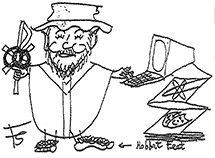CURIOUS So your life as a Christian has a sense of surety and permanence and at the same it is risky. How do these things make sense together?
EAGER: Remember how you started off by doubting that God has a Plan for me?
CURIOUS Yes, and I still do, I guess.
EAGER: Your questioning the idea of a Plan has made me do some thinking about what I mean. I think my experience of God acts like an anchor for my daily life, and a resource when life gets difficult.
CURIOUS So it was not a Plan like a driving plan for a motor trip to California?
EAGER No - it is like help on the way to get me somewhere?
CURIOUS Maybe then there is room for you to have some freedom?
EAGER: Of course, I was foolish to downplay the freedom I have. In fact, I feel more freedom with God as my anchor, than when I drifted.
CURIOUS I am glad to hear that. My own life and thoughts have been drifting a bit. But that makes me ask all the more questions! I want to ask you about the Bible.
EAGER: What about the Bible?
CURIOUS The other night on American TV, I saw a fierce young man pointing his finger in a threatening way at a political candidate, saying: “Do you, or do you not believe that every word in the Bible is true?” Do you believe that?
EAGER: No, but I have been tempted to. For some people that seems to be an easy way out. But there is quite a story behind the idea of “the Word of God.”
CURIOUS Got time to tell me?
EAGER: I’ll try to give you the short answer. The Hebrew people believed that God spoke to them: to Moses in the Burning Bush, to Moses by writing on the stone tablets of the Commandments, and in various ways by angels and messengers. So the men - and some women - who believed they heard God speak to them about the People of Israel would proclaim that what they were saying was “The Word of the Lord.”
CURIOUS So it was a spoken word, mainly?
EAGER: Mostly. But writing itself was a very sacred art, and words that were written or spoken were regarded as having great power –
CURIOUS Journalists and politicians still do!
EAGER: - Here’s a story from my Dad. He was part of a group, when he taught at University, who put on a Christian Mission. A man came to his office asking permission to display a collection of religious books. Dad looked at them, and said: “There’s only one of these I would let you display. All the rest of them are not revealing the Gospel, they are all written to disprove evolution!”
CURIOUS Whew! That took guts. I thought religious people don’t believe in evolution! Why would your Dad support evolution?
EAGER: All that fuss about evolution is mostly about the ignorance of so many people about the Word of God.
CURIOUS So, what does the “Word of God” mean?
EAGER: First, it is God speaking to us in our hearts. Then it is God speaking to us in the Human family, by various means, showing us the Way. The Bible is a collection of books and stories, and God’s message is found there, various expressions of it in various times. But the messages from God also come to the human race through human self-understanding, and through study of external nature which is the larger family setting of the human race.
CURIOUS You mean, the Word of God can come to us through science?
EAGER: Yes, of course. The world and the universe are God’s, and God speaks through all things.
CURIOUS Some religious people would crucify you for that!
EAGER: That happened more than once, and the one we usually associate with crucifixion, Jesus, is also the one who is in fact described in the Bible as the “Word of God.”
CURIOUS Where in the Bible?
EAGER: At the beginning of the Gospel according to John:
“In the beginning was the Word, and the Word was with God, and the Word was God…He was in the world, and the world was made by him, and the world knew him not.”
CURIOUS Hey! That’s cool! And risky! But is seems a long way from Science, and you say that God can come to us through science.
EAGER Maybe you should tell me how you see openings for the idea of God in the world of science?
CURIOUS Now you are challenging me!
EAGER Fair enough: your turn!

